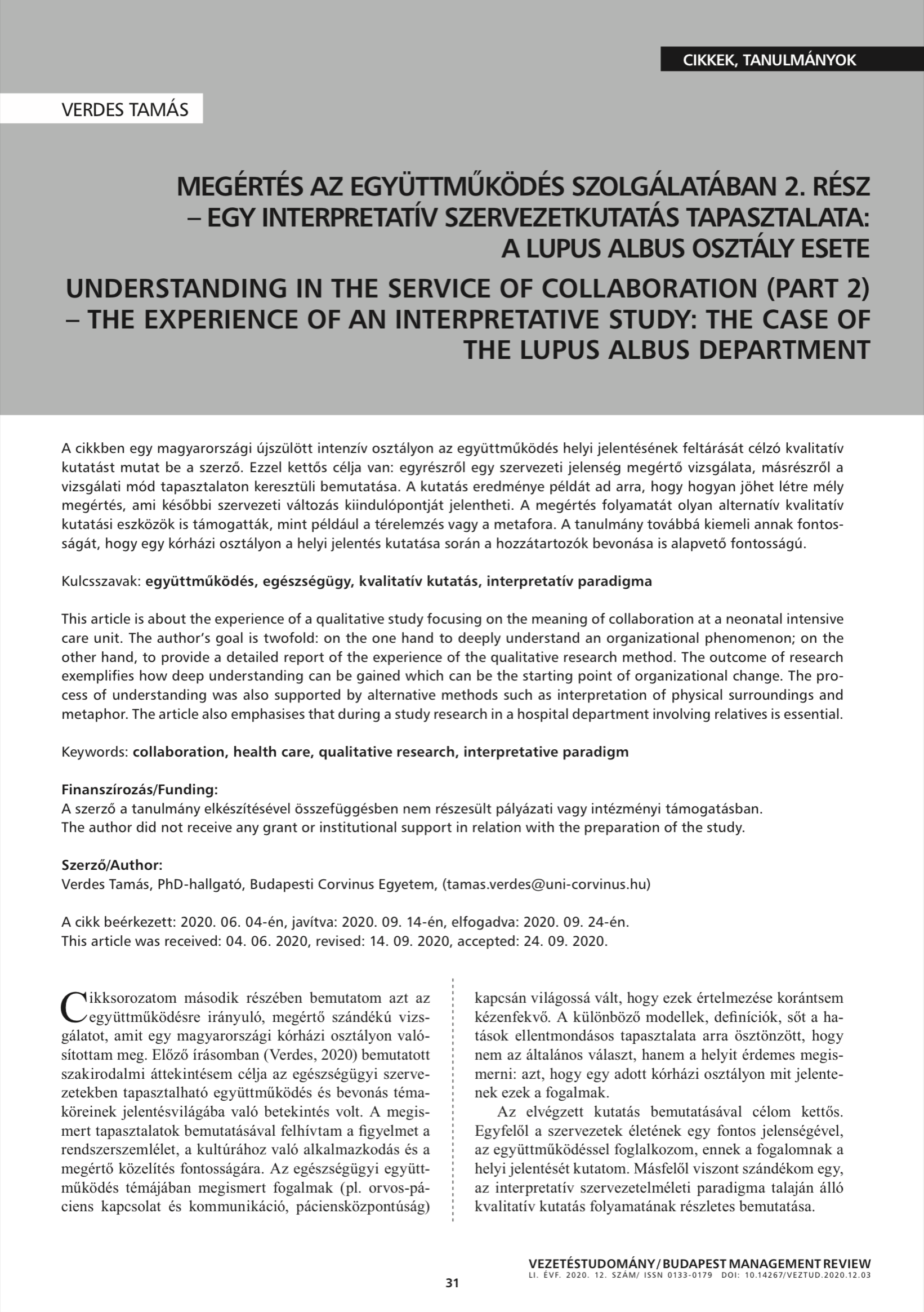Megértés az együttműködés szolgálatában 2. rész
Egy interpretatív szervezetkutatás tapasztalata - a Lupus Albus osztály esete
DOI:
https://doi.org/10.14267/VEZTUD.2020.12.03Keywords:
collaboration, healthcare, qualitative research, interpretative paradigmAbstract
This article is about the experience of a qualitative study focusing on the meaning of collaboration at a neonatal intensive care unit. The author’s goal is twofold: on the one hand to deeply understand an organizational phenomenon; on the other hand, to provide a detailed report of the experience of the qualitative research method. The outcome of research exemplifies how deep understanding can be gained which can be the starting point of organizational change. The process of understanding was also supported by alternative methods such as interpretation of physical surroundings and metaphor. The article also emphasises that during a study research in a hospital department involving relatives is essential.
Downloads
References
Burrell, G., & Morgan, G. (1979). Sociological Paradigms and Organisational Analysis. Oxford: Heinemann Educational Books Ltd.
Cocowitch, B. V., Orton, S., Daniels, J., & Kiser, D. (2013). Reframing Leadership Development in Healthcare. OD Practitioner, 45(3), 10–18. Retrieved from https://cdn.ymaws.com/www.odnetwork.org/resource/resmgr/odp45_3/vol45no3-cocowitch_et_al.pdf
de Haes, H. (2006). Dilemmas in patient centeredness and shared decision making: A case for vulnerability. Patient Education and Counseling, 62(3), 291–298. https://doi.org/10.1016/j.pec.2006.06.012
French, W. L., & Bell, C. H. (1995). Organization Development (5th ed.). Prentice-Hall International Inc.
Gelei, A. (2006). A szervezet interpretatív megközelítése. Vezetéstudomány, 38(1 ksz.), 79–97.
Gelei, A. (2020). Szervezetfejlesztés szerepe a sportpszichológiában. In Zs. Imre Tóvári, G. Simonné Goschi, & Á. Pálvölgyi (Eds.), A sportpszichológia tankönyve. Budapest: Medicina Könyvkiadó (szerkesztés alatt).
Goh, S. C., Chan, C., & Kuziemsky, C. (2013). Teamwork, organizational learning, patient safety and job outcomes. International Journal of Health Care Quality Assurance, 26(5), 420–432. https://doi.org/10.1108/IJHCQA-05-2011-0032
Horváth, D. (2015). Projektív technikák. In Alternatív kvalitatív kutatási kézikönyv (pp. 279–317). Budapest: Alinea Kiadó.
Kvale, S. (2009). InterViews. An introduction to qualitative research interviewing. Thousand Oaks: SAGE Publications.
Long, S. (2001). Cooperation and conflict: two sides ot the same coin. In R. Wiesner & B. Millett (Eds.), Management and Organisational Behaviour (pp. 95–108). Milton: John Wiley and Sons Australia Ltd.
Málovics, É., Vajda, B., & Kuba, P. (2009). Paternalizmus vagy közös döntés? Páciensek az orvos-beteg kommunikációról. In E. Hetesi, Z. Majó, & M. Lukovics (Eds.), A szolgáltatások világa (pp. 250–264). Szeged: JATEPress.
Mason, J. (2005). Kvalitatív kutatás. Budapest: Jószöveg Műhely. PAF Közhasznú Alapítvány. (2020). Pozitív Attitűd Formálás. Az emberibb egészségügyért. Retrieved from www.pafhungary.hu
Ratnapalan, S., & Uleryk, E. (2014). Organizational Learning in Health Care Organizations. Systems, 2(1), 24–33. https://doi.org/10.3390/systems2010024
Senge, P. M. (1998). Az ötödik alapelv. Budapest: HVG Kiadó. Stoelwinder, J. U., & Clayton, P. S. (1978). Hospital Organization Development: Changing the Focus from ‘Better Managenment’ to „Better Patient Cared. The Journal of Applied Behavioral Science, 14(3), 400–414. https://doi.org/10.1177/002188637801400314
Szeverényi, P. (2008). A családközpontú szülészeti gyakorlat lehetőségei a lelki egészség megőrzésében. Nőgyógyászati és Szülészeti Továbbképző Szemle. Retrieved from http://medicalonline.hu/gyogyitas/cikk/a_csaladkozpontu_szuleszeti_gyakorlat_lehetosegei_a_lelki_egeszseg_megorzeseben
Tempfer, C. B., & Nowak, P. (2011). Consumer participation and organizational development in health care: A systematic review. Wiener Klinische Wochenschrift, 123(13–14), 408–414. https://doi.org/10.1007/s00508-011-0008-x
Verdes (2020). Megértés az együttműködés szolgálatában 1. rész – Az együttműködés megértésének lehetőségei egy egészségügyi szervezetben. Vezetéstudomány, 51(10), 29-39. https://doi.org/10.14267/VEZTUD.2020.10.03
Wollnik, M. (1995). Interpretatív megközelítések a szervezetelméletben. In A. Kieser (Ed.), Szervezetelméletek (pp. 359–383). Budapest: Aula Kiadó Kft.

Downloads
Published
How to Cite
Issue
Section
License
Authors assign copyright to Vezetéstudomány / Budapest Management Review. Authors are responsible for permission to reproduce copyright material from other sources.

